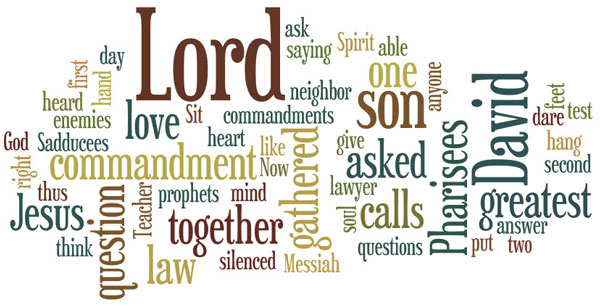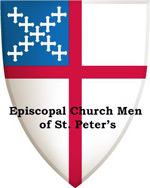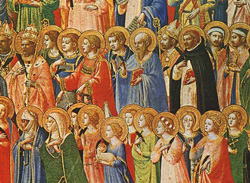I.Theme – Love as the greatest of God’s commandments.

"The Greatest Commandment " – From Wortle
The lectionary readings are here or individually:
Old Testament – Leviticus 19:1-2,15-18
Psalm – Psalm 1 Page 585, BCP
Epistle –1 Thessalonians 2:1-8
Gospel – Matthew 22:34-46
These passages this week echo the challenge of the Christian journey. We have moments when we see God’s reign breaking through in this world–moments of justice, of hope, of peace–and other times, it seems like war, poverty and famine will continue forever. But we do not lose hope, and we know that our part counts in the reign of God. And our part is to create equitable relationships with those around us. We can’t expect to save the world but we can seek to maintain relationships with those around us.
Leviticus provides a taste of the holiness codes of Israel, on how to live in community with one another. Leviticus is one of the most difficult books to read in the Bible, mainly for the listing of codes and laws that do not necessarily make sense in today’s society, and we are missing the context, both historically and culturally for understanding the application of them. However, the theme of how to live together in community is a theme that transcends some of the cultural and historical context–when decisions or judgments have to be made in the context of community, you can’t show partiality, but you have to be just. In connection with the Gospel the statements on our neighbors concern us – avoiding hatred, vengeance, grudges and basically love your neighbor
In 1 Thessalonians 2:1-8, Paul shares about his journey to Thessalonica, not physically, but rather how he has come to be there on his journey of faith–coming not to judge or to trick them or to test them, nor to please them or flatter them, but simply coming as they are, people who follow God. Echoing back to the passage in Leviticus, Paul is coming as a person of the community of faith–treating the Thessalonians as such, and expecting the same treatment in return. Paul tells them “so deeply do we care for you that we are determined to share with you not only the gospel of God but also our very selves” (vs 8). To Paul, telling about God is one thing–living it out is what we are called to do, by sharing ourselves fully with the members of the faith community–being our honest and true selves, without trickery or deceit, without slander or gossip or hate in our hearts–but to be genuine people that follow Christ.
Psalm I extols the blessedness of one who avoids the path of the wicked and walks in the way of wisdom and life. The psalm is built around two contrasting images, that of a tree planted by streams of water and that of chaff in the process of winnowing the grain. The former is an image of the righteous, the latter of the wicked. The former person is ‘happy’ or ‘blessed’, the latter is perishing.
The tree prospers by fulfilling its purpose of bearing fruit in its season. God has ordained that this is a process which takes time, indeed, a different time for each individual. We prosper by growing in grace, coming to maturity, and bearing fruit. Material prosperity is not the principle focus of this text.
The law was not only the source of specific rules and regulations, but it was also intended to teach the Israelites principles which would govern their actions. The fundamental issue underlying the Sermon on the Mount was over the interpretation of the Old Testament law
Matthew’s passage is on the Greatest Commandment. Jesus has been leading up to this pinnacle teaching in his parables and teachings about the kingdom or reign of God. This passage represents the third of three attempts to entrap Jesus, after he has entered Jerusalem in triumph, riding on a donkey, with a large crowd spreading cloaks and branches on the road as they shouted, “Hosanna to the Son of David.”
After the Pharisees and the Sadducees have questioned him, a lawyer asks him which is the greatest commandment. On the face of it, the question appears very honest. The Pharisees identified 613 commandments in the Torah (the first five books of the Bible). Two hundred forty-eight were positive (“thou shalt”) and three hundred sixty-five were negative (“thou shalt not”). How could anyone remember all of them? Were some more important than others?
And Jesus sums up the commandments in the recitation of the Shema, “You shall love the Lord your God with all your heart, and with all your soul, and with all your mind,” and with the call “You shall love your neighbor as yourself.” He was the first to place both of these side by side.
Both of these commandments sum up the Ten Commandments, for the first four are about relationship with God and the last six are about relationship with each other in the community. But Jesus goes further in saying, “On these two commandments hang all the law and the prophets.” In Jesus’ day, the Bible that the Jews knew had the Torah, the Law, the first five books–and it contained the books of the prophets (the Psalms and other writings were still being compiled). Basically, Jesus is saying that this is the point of the whole Bible. Everything else hangs on it. All other laws, codes, rules, ordinances and such fall under these two commandments. This is the point of the whole thing.
After answering this question, however, Jesus poses a question to the Pharisees about whose son the Messiah is. Jesus is trying to emphasize that the Messiah is the son of God, not just of David–in other words, the Messiah, while prophesied about in Hebrew scripture and understood in Jewish culture, is a Messiah for the world, not just for the people. Jesus is not just the son of David as a descendant of David, but Jesus is the Son of God, and therefore a Messiah for all people. And therefore Jesus’ teachings about loving others and loving God are beyond the community present but are teachings to be lived out by all who follow Jesus. They are beyond the law and culture of one people, but for the whole world.
Read more







